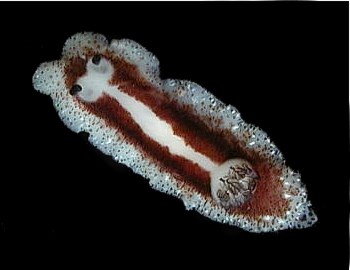Jorunna parva? from Japan
July 5, 2000
From: Satoru Hori

Dear Bill
This sea slug is 30mm long, found at 1m depth, at Miura peninshula, Japan.
I could not find any similar species in some Japanese sea slug books.
Would you identify this for me?
Satoru
http://www.asahi-net.or.jp/~IK8S-HR/umiushi.html
ik8s-hr@asahi-net.or.jp
Hori, S., 2000 (Jul 5) Jorunna parva? from Japan. [Message in] Sea Slug Forum. Australian Museum, Sydney. Available from http://www.seaslugforum.net/find/2654Dear Satoru,
I have never seen this colour form before but I suspect it is a species of Jorunna. It looks very similar to Thordisa parva Baba, 1938. There is a painting in Opisthobranchs of Sagami Bay (Baba, 1949, Plate 24 fig. 90) of an animal with brownish bands down each side of the mantle very much like in your photo but not as intense.
The original description of Thordisa parva is of a 6mm animal with 'grayish yellow' body and black stains here and there on dorsal papillae and edge of foot. The back is covered with caryophyllidia. In Atsushi Ono's recent book there is a yellow animal with scattered black
papillae (p.113) which he identifies as Jorunna parva (Baba, 1938). It looks like an intermediate between the yellow colour forms of Jorunna sp. 2, and has the large black patch at the posterior tip of the foot which is characteristic of Jorunna sp. 2.
What I am not sure of is whether the round black spot on the tip of the foot in Baba's original description of Thordisa parva, the similar black spot in the Sagami Bay painting, indicate that Jorunna parva is different from Jorunna sp. 2 or not. Your photo only shows a small part of the posterior foot but from that there seem to be a row of small black spots around the edge and a larger, partially hidden, black spot in the posterior midline.
All I can say is that your animal seems to be the same as the Thordisa parva in Opisthobranchs of Sagami Bay. If you have photos or notes on other similar species of Jorunna it would be interesting to compare them with the photos on the Forum of Jorunna sp. 2, and in particular, check how consistent the black spot is on the foot.
References:
• Baba, K. (1938) Opisthobranchia of Kii, Middle Japan. Journal of the Dept of Agriculture, Kyushu Imperial University, 6(1): 1-19.
• Baba, K. (1949) Opisthobranchia of Sagami Bay. Iwanami Shoten: Tokyo
Best wishes,
Bill Rudman.
Related messages
-
Re: Jorunna parva from nthn Mariana Islands
From: Yuji Fujie, October 3, 2008 -
Re: Jorunna parva from Japan
From: Teresa Zuberbühler, July 14, 2008 -
Jorunna parva? from Japan
From: Yukari Sato, November 15, 2003 -
Re Jorunna parva from Japan
From: Jun Imamoto, September 15, 2001 -
Thordisa parva and Jorunna parva
From: Nishina Masayoshi, September 10, 2001 -
Jorunna parva and J. pardus
From: Nishina Masayoshi, September 10, 2001 -
Jorunna parva f rom Japan
From: Nishina Masayoshi, September 8, 2001
